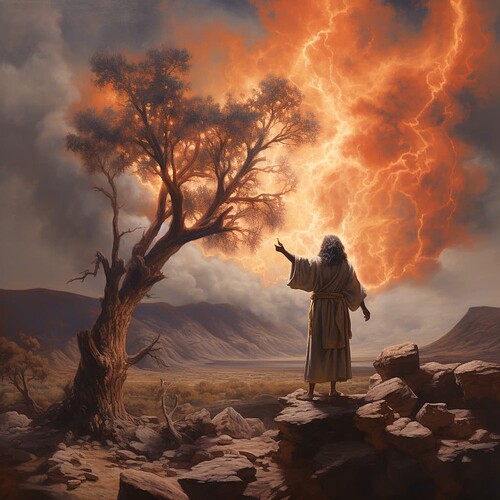Embracing Divine Purpose in the Midst of Uncertainty
![]() Introduction
Introduction
In today’s reading, we journey through Exodus 3 and 4, witnessing a pivotal moment in biblical history. These chapters unveil Moses’ divine calling at the burning bush and his initial reluctance, followed by God’s reassurance and empowerment for the monumental task ahead.
![]() Exodus 3: The Burning Bush
Exodus 3: The Burning Bush
This chapter introduces us to a remarkable encounter between Moses and God at the burning bush. Here, God calls Moses to lead the Israelites out of Egypt. This narrative not only symbolizes God’s holiness but also His intention to rescue His people.
![]() Key Verse: “I have indeed seen the misery of my people in Egypt. I have heard them crying out because of their slave drivers, and I am concerned about their suffering.” — Exodus 3:7
Key Verse: “I have indeed seen the misery of my people in Egypt. I have heard them crying out because of their slave drivers, and I am concerned about their suffering.” — Exodus 3:7
![]() Exodus 4: Moses’ Reluctance and God’s Assurance
Exodus 4: Moses’ Reluctance and God’s Assurance
Exodus 4 highlights Moses’ hesitation and self-doubt in the face of God’s calling. Despite his objections, God provides Moses with signs and promises His continual presence, emphasizing that God equips those He calls.
![]() Key Verse: “Now go; I will help you speak and will teach you what to say.” — Exodus 4:12
Key Verse: “Now go; I will help you speak and will teach you what to say.” — Exodus 4:12
![]() Key Themes and Reflections:
Key Themes and Reflections:
Divine Encounter and Commission: The burning bush encounter is a transformative moment for Moses, revealing the divine commission intertwined with God’s concern for His people.
Overcoming Doubt with Divine Assurance: Moses’ reluctance and self-doubt are met with God’s patient reassurance, emphasizing that God’s calling comes with His enabling.
The Power of Faith in Action: The narrative encourages us to step out in faith, trusting that God equips and strengthens us for the tasks He assigns.
![]() Today’s Application:
Today’s Application:
Reflect on the times you’ve faced doubt or uncertainty in your calling. How can you draw strength from the story of Moses, trusting in God’s guidance and provision? Consider the importance of faith and obedience in your journey, even when the path seems unclear.
![]() Hidden Gem:
Hidden Gem:
Did you know? The burning bush, a plant on fire yet not consumed, symbolizes God’s holy presence and His eternal, unchanging nature amidst life’s challenges.
![]() Reflective Q&A:
Reflective Q&A:
![]() Exodus 3: The Burning Bush
Exodus 3: The Burning Bush
![]() Divine Calling Amid Ordinary Circumstances: How does Moses’ encounter with God at the burning bush inspire us to find divine purpose in our everyday lives?
Divine Calling Amid Ordinary Circumstances: How does Moses’ encounter with God at the burning bush inspire us to find divine purpose in our everyday lives?
A: This event shows that God can meet us in ordinary circumstances, transforming them into pivotal moments of divine calling. It reminds us to stay open and attentive to God’s voice in our daily routines.
![]() Understanding God’s Heart for His People: How does God’s message to Moses reflect His concern for humanity and desire for liberation?
Understanding God’s Heart for His People: How does God’s message to Moses reflect His concern for humanity and desire for liberation?
A: God’s message to Moses reveals His deep compassion and commitment to deliverance. It underscores God’s desire to free His people from oppression and lead them to a promised future.
![]() Exodus 4: Moses’ Reluctance and God’s Assurance
Exodus 4: Moses’ Reluctance and God’s Assurance
![]() Overcoming Self-Doubt with God’s Strength: How does Moses’ interaction with God in Exodus 4 encourage us when facing self-doubt or inadequacy?
Overcoming Self-Doubt with God’s Strength: How does Moses’ interaction with God in Exodus 4 encourage us when facing self-doubt or inadequacy?
A: This interaction teaches us that when God calls us, He also provides the necessary strength, resources, and guidance. It encourages us to lean on God’s strength rather than our own abilities.
![]() The Role of Faith in Answering God’s Call: How does Moses’ eventual obedience model the importance of faith in embracing God’s plan?
The Role of Faith in Answering God’s Call: How does Moses’ eventual obedience model the importance of faith in embracing God’s plan?
A: Moses’ shift from reluctance to obedience exemplifies the transformative power of faith. It demonstrates the importance of trusting God’s plan, even when it challenges our comfort zones.
![]() Join the Discussion:
Join the Discussion:
What insights do you gain from Moses’ story that apply to your life today? How do you see God’s guiding hand in your personal journey? Share your experiences and reflections in the comments below!
#BurningBush #Moses #Faith #Obedience bible
